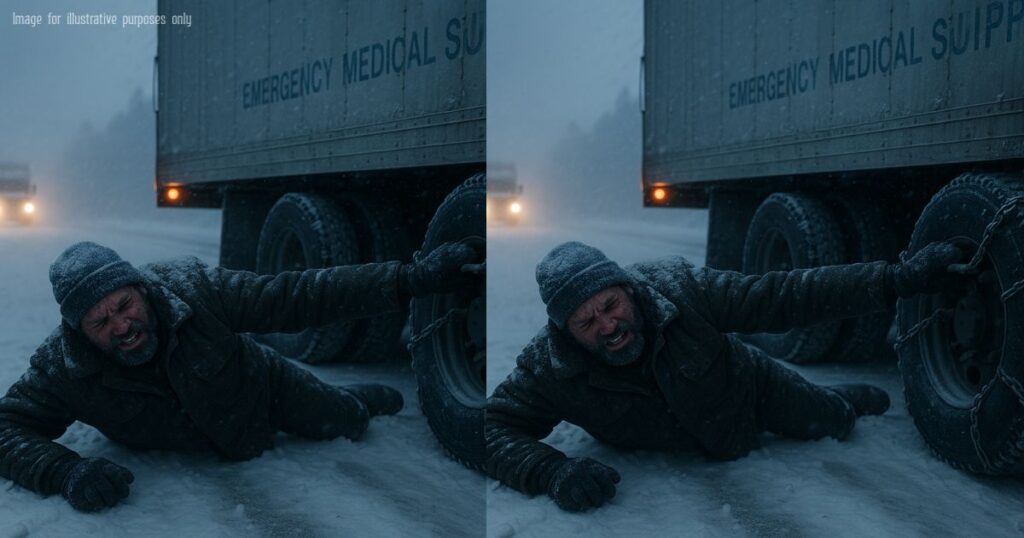“I Brought Your Medicine, Your Food, Your Christmas Gifts. But I’ve Spent 12 Birthdays Alone.”
A trucker’s lament in a world that forgot how things got where they are.
I brought your medicine, your food, your Christmas gifts. But I’ve spent 12 birthdays alone.
Not that anyone asked.
Truth is, I haven’t celebrated my birthday since ’09. That year, my granddaughter called me from the backseat of her mama’s car, singing off-key and sweet as cherry pie.
I pulled over somewhere outside Tulsa and cried like a fool, forehead pressed to the wheel, taillights streaking past like comets. Ain’t no Hallmark card for that kind of feeling.
I’ve been a long-haul trucker for thirty-seven years. One-point-two million miles. Eighty-three thousand hours behind the wheel. Seven transmissions.
Three different wives. Two heart attacks. One herniated disc that still flares up when I hit a pothole doing sixty. You could say I’ve paid my dues in diesel and time.
These days, though, I ain’t sure anyone even notices.
Used to be, when I pulled into a truck stop, there’d be a line of us—real drivers, boots dusty, arms strong, backs tired, swapping war stories over burnt coffee and scrambled eggs.
Now? I see more vending machines than people. Fewer laughs, more earbuds. And every week, another guy gets pushed out—his rig sold off, his routes cut, replaced by some tech wizard’s idea of “progress.”
They say the future is autonomous. Driverless. Efficient.
You ever seen a robot pull a crying kid out of a snowbank in Utah because his mama’s car slid off the road? I have. I left my route to do it. Got docked for the delay, too.
But I slept easy that night.
—
My first rig was a ‘79 Kenworth W900. Cherry red. Chrome stacks. She was a beast. No GPS, no backup cameras—just a CB radio, a road atlas, and a gut instinct you either had or didn’t.
I still remember how proud I felt pulling into my first delivery, unloading fifty crates of apples in the Bronx, a small-town Indiana boy dodging taxis like I belonged.
Back then, the job meant something. You weren’t just delivering stuff—you were a lifeline. You kept shelves stocked, hospitals supplied, families fed.
Somewhere along the line, though, we stopped being people. We became “units.” Our hours tracked by satellite. Our stops timed to the second. Get there too early? You wait. Too late? You lose the load.
I once missed my mother’s funeral because dispatch wouldn’t release the rig until I finished my delivery window. Said it was “out of their hands.”
That was twelve years ago.
I still hear her voice sometimes. Usually around midnight, when the world’s asleep and the only sound is the low hum of tires against asphalt. She’s telling me to eat something warm, asking if I’m getting enough sleep. She’d never understand this world now—where a man’s loyalty means less than a lithium battery.
—
Last winter, I pulled into a rest area in Montana during a whiteout. Visibility maybe six feet. I was running hot soup to a reservation hospital. Emergency load. Halfway through chaining up, I slipped on black ice and landed hard. Tore something in my shoulder.
You know what kept me going?
The thought of a little girl with a fever waiting on that soup. Her grandma spooning it into her mouth while the snow howled outside. Maybe it wasn’t like that. Maybe it was just paperwork and bored nurses. But I needed to believe it mattered.
Because if it doesn’t… what the hell am I still doing out here?
They’ve started phasing in AI convoys now. Sleek rigs with no steering wheels. They hum along the interstates like ghosts. I’ve passed a few. They don’t wave. Don’t flash their lights in thanks when you move over. They just glide. Silent. Efficient.
Cold.
Last week, they let old Jimmy Haskins go. Fifty-one years on the road. No pension, no farewell party—just a cold email and a locked-out login. He sat in his truck for six hours after, didn’t even call his wife. Said he didn’t know how to tell her he’d gone from legend to obsolete.
Me? I’ve got six months left on my contract. They say they won’t renew.
Guess they figure my hands shake too much now. That my reflexes are slow, my bladder too weak, my stories too long. I keep hearing “liability” in the meetings. Liability. That’s what I am now.
But I was there, damn it. Through hurricanes, blackouts, pandemics. I drove straight into fires, floods, and riots. I kept going when fuel hit five dollars a gallon, when bridges collapsed, when half the world stayed home.
You want your packages overnight?
It was me.
You want to eat fresh strawberries in February?
That was me too.
But they never put our names on the box.
—
The other day, I pulled into a truck stop near Amarillo and saw a kid—maybe twenty—sitting by his rig, cigarette trembling between his fingers. Newbie. You could smell it. I offered him a cup of coffee and a story.
Told him about the time I outran a tornado in Kansas with twenty tons of fertilizer strapped down behind me. How the sky turned green, and I prayed out loud for the first time since ‘Nam.
He laughed, eyes wide like I used to be. Then he said, “Man, they should make a movie about guys like you.”
I nodded, but deep down, I knew they wouldn’t.
Nobody makes movies about the ones who kept America running in the background.
—
So here I am. One-point-two million miles behind me. And tonight, I’m parked at a rest stop outside Cheyenne. No calls. No cake. Just me, a cold sandwich, and the low hum of diesel ticking as it cools.
I used to feel like I was moving America forward.
These days, I feel like I’m in its way.
And maybe… just maybe… that’s the loneliest mile of all.


